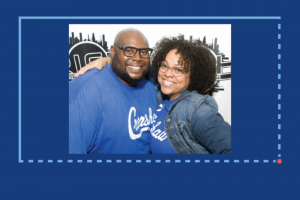
RICH-Restoring Inner City Hope was founded by the husband-and-wife team of Mike Battle, executive director, and Dani Battle, deputy director.
SIL: Tell us about RICH-Restoring Inner City Hope. What are you working on?
We are expanding our offerings from the RICH-Restoring Inner City Hope Center in the Cherry Hill neighborhood of Baltimore. We now run an after-school program for boys in middle school centered around leadership and personal development. We are working to grow the program to include middle-school-aged girls. We are also starting a workforce development program for adults in the community, including parents of participants in our youth programs.
SIL: Why did you decide to start this? Where did the idea come from?
Our mission is to love, inspire and empower youth and families in Baltimore, and we are starting in Cherry Hill, a historically marginalized community in South Baltimore. The area has always been looked at negatively by those who knew nothing of the small community aside from what they saw on the news or heard from others.
Michael Battle, executive director of RICH, grew up in Cherry Hill. His mother was addicted to drugs and died from an overdose when Battle was 14. Because of the lack of resources and knowledge of resources available, he made some bad choices. Once he turned his life around, Battle knew that he wanted to give back to the community and offer kids who are a lot like he was some alternatives and new experiences. We have been working in this community for over nine years.
From our first prayer walk of 34 people, RICH has grown to be a resource center and programmatic hub for the entire community.
We chose to target boys in middle school after we were asked by the principal of Cherry Hill Elementary/Middle School, Tracey Garrett, to create a program to develop their leadership and personal skills. We have always said we wanted to do our part to fill in the gaps in Cherry Hill.
SIL: What would you consider success for RICH-Restoring Inner City Hope? How will the world be different when you are successful?
Success for us would be providing the residents in the community we serve a broader understanding of what the world has to offer. Be it in employment, activities or hobbies, we want to open the world to our clients.
This means offering new experiences for kids during after-school programming to inspire them to learn more about different things, such as photography, starting a small business or even joining a rowing team. It also means the adults we prepare for the workplace secure a job and flourish while applying the soft skills and self-confidence they developed.
SIL: What have you accomplished so far?
We have moved our work from community outreach events to working in our own physical space. We still host walks, festivals and outreach-based giveaways, but we also have the after-school program for young men. Our building has become a COVID-19 relief site during the pandemic, where community members can receive food, sanitizing products, games, books and masks and gloves.
SIL: How can people get involved in supporting you in your venture?
The easiest way to get involved with the RICH Program is through our website. You can sign up to connect with us, volunteer, donate or partner with us.
SIL: What do you like most about the Baltimore entrepreneurial community? What would you like to see more of?
We love seeing the different ways people have shifted their passions into action. This city needs love, and seeing how people who share our desire by serving in other ways is refreshing and inspiring. Being out there giving from your heart every day requires that you refill your cup. Sharing time and space, or even social media posts, with these fantastic social entrepreneurs fills our cups back up.
We would love to see more social entrepreneurs from historically marginalized communities be supported in bolstering their communities. We want to see healing happening from within.
SIL: What advice do you have for would-be social entrepreneurs thinking about starting a venture?
Get your rest while you are planning, because once you start to actually do this work, you will see that so much more needs to be done than you initially expected, and sometimes you are the only person or team that can meet specific needs. Because there is so much work to do, you also should be actively seeking out other social entrepreneurs and creating relationships with them. Use these opportunities to combine efforts to increase your reach and impact.
SIL: Why did you apply to SIL? What attracted you to SIL?
We had the passion and action plan, but we needed to be more organized. We wanted to cultivate deeper understanding around strategic planning, fundraising, sustainability and so many other areas of need for strong nonprofits. We also wanted to expand our network to include social entrepreneurs who have a variety of interests and passions. We wanted to be inspired and empowered by other social entrepreneurs in ways that would push us harder and further in the work we are doing.
Read more about RICH here. To learn more about the Social Innovation Lab and the 2020–21 cohort, click here.